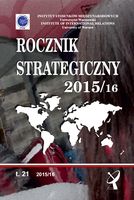Przegląd sytuacji strategicznej - aspekty globalne i regionalne
AN OVERVIEW OF THE STRATEGIC SITUATION: REGIONAL AND GLOBAL ASPECTS
Author(s): Roman KuźniarSubject(s): Politics / Political Sciences, Politics, International relations/trade
Published by: Wydawnictwo Naukowe Scholar Sp. z o.o.
Keywords: Brexit; Prawo i Sprawiedliwość; Trójkąt Weimarski; Międzymorze; cesarstwo rzymskie; Kolonia; Nemezis; Traktat o Unii Europejskiej; ordoliberalizm; Grupa Wyszehradzka; Mińsk II; Nord Stream II; TPP; II
Summary/Abstract: For many reasons, the year 2015 will be remembered as a particularly bad time in recent history. The protracted EU crisis, or, more precisely, several crises, culminated dramatically in a sudden overwhelming refugee and migrant influx from the Middle East, North Africa, and some Balkan countries. Obviously, the main source of this wave was the war in Syria. The French involvement in the conflict resulted in e.g. a bloody terrorist attack in Paris, November 2015, and in Brussels, March 2016. Many defined the former as the “French September 11”. EU members disagreed as to how to face the refugee and migrant crisis, which contributed to further weakening of the Union’s coherence. A rise of nationalistic political forces and the prospect of Brexit turned out to be another important factor in the dangerous split within the Union. Paradoxically, the most powerful member of the EU seemed to be its weak link: for many, Berlin was too soft on both security matters and the refugee plus migrant crisis. The situation in Europe’s neighbourhood continued to be very difficult. The Middle East was on fire at many points. Libya remained in chaos, while in Egypt, military dictatorship was taking solid roots. An agreement between Iran and the West (plus Russia) was the only positive development in the region and globally in the 2015. Moscow changed its tactics towards the West. It decided to stop applying direct pressure upon Europe and shifted its attention to the Syrian conflict. On the one hand, it wanted to “help” the West to crush the IS, but on the other, it saved its political pupil Bashar al-Assad and became an indispensable partner in the search of peace in this part of the region. Turkey and Saudi Arabia once again showed their dubious loyalty as allies of the West. To complete this rather gloomy picture, it should be added that America gave up its role of a global leader much before its scheduled brief absence due to the presidential campaign every four years. In this context, one should appreciate China’s politico-strategic restraint and the overall, although fragile stability in Eastern Asia.
Journal: Rocznik Strategiczny
- Issue Year: 2015
- Issue No: 21
- Page Range: 19-40
- Page Count: 22
- Language: Polish

